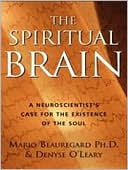

 |

|

The average rating for The Spiritual Brain: A Neuroscientist's Case for the Existence of the Soul, Vol. 2 based on 2 reviews is 3.5 stars.
Review # 1 was written on 2012-05-14 00:00:00 Jjj Jjjj Jjj JjjjI got this book a couple of years ago but was put off reading it by a couple of reviews that trashed it, saying it was rubbish pseudo-science and poorly researched and with an axe to grind. So I ignored it and read other recommended neuroscience books. Recently I decided to read it anyway and learn from its mistakes. I was astonished to find a very well researched book that was rigorously scientific in its approach. I found it a thought-provoking and enlightening read. Wish I'd read it earlier. What a fool I was listening to those negative reviewers without assessing it for myself. Don't confuse scientific with neutrality. This book isn't an impartial account. It is a fierce attack on materialists - people who believe that the only explanation allowed for this universe and consciousness is one that only uses matter (i.e. there is no such thing as the spiritual dimension or the soul). The book looks at recent research on the brain and gives several compelling arguments why a person's mind is not identical to the electrochemical activities of his/her brain. For example there are reliably documented cases of people seeing things happening around them during near death experience while attached to medical instruments showing no brain activity. Elsewhere I have read explanations that a person having a spiritual experience was really having a epileptic fit in their temporal lobes. The neurological evidence laid out in this book convincingly destroys that theory. The tone of the book is quite hot. I can understand why somebody who doesn't believe in a spiritual aspect to life would want to spit this book out. But a book cannot be dismissed as pseudo-scientific just because the author holds to a worldview different from yourself. The evidence needs to be looked at and counter-arguments listened to. Read it, weigh up the evidence presented and make an informed assessment for yourself. Don't make my earlier mistake and dismiss the book without reading it. |
Review # 2 was written on 2014-05-17 00:00:00 Edward Edmonds Edward EdmondsI found the structure of "The Spiritual Brain" frustrating. As others have commented, Beauregard and O'Leary make an overt and excessive case against orthodox materialism but the text is interspersed with quotations of what the authors attempt to refute, which I found somewhat disruptive in terms of being able to pull coherent themes from their case. The central thesis is that a separation exists between our physical brain and consciousness and that phenomena associated with psi, the placebo effect, Near Death Experiences (NDEs), and other mystical experiences confirm this, however I am not sure a clear enough case was made in this regard. That is not to say that the case cannot be made but I just didn't feel it was made clearly within this work when compared with other scholars writing on similar topics. Perhaps my favourite part was how the authors framed the concept of "promissory materialism", or rather, the frame of thought orthodox materialists use to deny the possibilities of different paradigms that may hold the key to new understandings. The notion that whatever cannot currently be explained "will be" so we just have to wait while marginalizing ideas in the process that are theoretically legit yet untestable such as the Anthropic principle. This wouldn't be a problem if materialists weren't hostile to alternative investigations, but given the monistic nature of the system, and the perceived notion that any evidence against it could send its legitimacy tumbling, the paradigm is a breeding ground for our natural tendency to subscribe to "hallway" thinking. This promotes a structural perpetuation of blind-spots and the type of heretical reactions that have accompanied all new forms of thought from the Enlightenment onward. Of the explanations provided that were legitimate, I enjoyed the one that countered the materialist proposition that we haven't "free will" and that consciousness is contingent on our brain, a physical mechanism. These authors hold that consciousness does not appear to have a physical mechanism, and that it is a quantum system, whereby "…the action of holding an idea in place is truly a decision you make, in the same way that the physicists hold a particle in place by deciding to continue to observe it". And since we know from quantum physics that non-mechanical causes exist, why wouldn't one consider the extent to which this makes sense? From an entertainment perspective, I found the sections on psi, the God helmet and the Carmelite experiences quite lame but the section on NDEs profound. The themes discussed match up succinctly with those explored by other reputable scholars and the general idea that consciousness and matter are only a partial reality. After having read numerous works by various scholars, I tend to the subscribe to the transcendental view that a fundamental reality exists that we cannot perceive given our terrestrial vulgarities and that organized religion has been man's attempt to explain our inherently numinous and universal human experience. 3 out of 5 stars for Beauregard and O'Leary! |
CAN'T FIND WHAT YOU'RE LOOKING FOR? CLICK HERE!!!